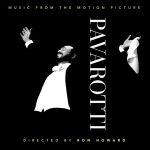|
Back
06/27/2019
“Pavarotti: Music from the Motion Picture”
Giacomo Puccini: Turandot: “Nessun dorma” – La bohème: “O soave fanciulla” – Tosca: “E lucevan le stelle” – Manon Lescaut: “Dona non vidi mai”
Ernesto De Curtis: Voce ’e notte
Gaetano Donizetti: La Fille du régiment: “Pour mon âme quel destin” – L’elisir d’amore: “Una furtiva lagrima” – “Me voglio fa’na casa”
Giuseppe Verdi: Aida: “Celeste Aida” – Rigoletto: “Questa o quella” – “La donna è mobile – La traviata: “Libiamo ne’ lieti calici”
Ruggiero Leoncavallo: Pagliacci: “Vesti la giubba”
Gaetano Lama: Silenzio cantatore
Francesco Paolo Tosti: A vucchella
Eduardo di Capua: O sole mio
Brian Eno, Bono, U2: Miss Sarajevo
Alessandro Stradella: Pietà, Signore
Franz Schubert: Ave Maria, D. 839
Luciano Pavarotti (tenor), John Weston (piano), The John Alldis Choir, Wandsworth School Boys Choir, London Philharmonic, Zubin Mehta (conductor), Berliner Philharmoniker, Herbert von Karajan (conductor), London Symphony Orchestra, English Chamber Orchestra, Richard Bonynge (conductor), National Philharmonic Orchestra, Nicola Rescigno (conductor), Philadelphia Orchestra in the Academy of Music, Riccardo Muti (conductor), Carnegie Hall
Recording: Various venues (1964-1993) – 79’18
Decca Classics # B0030330-02 (Distributed by Universal Music) – Booklet in English

   
At the height of his fame, Luciano Pavarotti played an opera star in his film debut Yes, Giorgio, to which filmgoers gave a resounding ‘No Luciano!’ In director Ron Howard’s new documentary Pavarotti the public is falling in love with him again as Howard showcases excerpts of Pavarotti’s most defining performances on opera stages around the world. Pavarotti is indeed radiant as he performs some of his most famous roles. The archival film is gold and the sound impeccably remastered to their full acoustic dimensions. Pavarotti’s record label, Decca, has also released ‘music from the film’ soundtrack, a well-curated mix of both live and studio tracks, in performances with various orchestras covering all phases of his career. For new opera fans, this is a terrific ‘greatest hits’ package of a legendary tenor…for opera aficionados, its joys will be in catching Pavarotti’s exquisite, in-the-moment vocal subtleties, at various stages of his career, in recording studio takes and especially on the live tracks.
The recording starts, predictably, with Pavarotti’s bravura performance of Puccini’s “Nessun dorma”, but one that makes you lean in because it is so different from the one that most people are familiar with. Decca chose his performance with the London Philharmonic with Zubin Mehta conducting and a shimmering chorus of The John Alldis Choir and Wandsworth School Boys Choir. But the disc also includes Pavarotti’s most famous version with José Carreras and Plácido Domingo (The Three Tenors) with Mehta conducting the Orchestra del Teatro dell' Opera di Roma that reached the top of the pop charts…it was so sensational.
Among the many soundtrack’s many other highlights:
1) La bohème: “O soave fanciulla”. Pavarotti’s breakthrough role as Rodolfo that launched his international career is as moving as ever with Herbert von Karajan conducting the Berliner Philharmoniker. In this recording his chemistry with soprano Mirella Freni is simply luminous.
2) Rigoletto: “Questa o quella” with the Royal Opera House Covent Garden/Sir Edward Downes, followed up by “La donna è mobile” with Richard Bonynge conducting the London Symphony Orchestra.
3) Tosca: “E lucevan le stelle” with Nicola Rescigno conducting the National Philharmonic Orchestra. It is, of course, one of Pavarotti’s most powerful tragic arias and in the documentary, it makes a most climatic scene. There is close up footage of Pavarotti performing Tosca in 2000, late in his career, in Rome with Plácido Domingo conducting. Pavarotti’s voice is full and transcendent in the performance as the doomed artist, Mario.
4) L’elisir d’amore: “Una furtiva lagrima” with the English Chamber Orchestra, particularly synergistic with the harpist (unfortunately dates and personnel are not listed in the notes) and conductor Richard Bonynge.
5) Pagliacci: “Vesti la giubba”. Pavarotti can be credited for rescuing “Vesti la giubba” from what became an overwrought musical joke in The United States, to, instead, its musical heights in a shimmering live recording with the Philadelphia Orchestra in the Academy of Music with Riccardo Muti conducting.
6) Gaetano Lama: “Silenzio cantatore. Robustly showcases Pavarotti as the quintessential Italian love song maestro.
7) Francesco Paolo Tosti: “A vucchella”. This Italian lullaby was recorded live in recital at Carnegie Hall with pianist John Weston, and it also includes their stirring reading of the Stradella’s 17th century religious/art song, “Pieta, Signore”.
8) “Miss Sarajevo”, a collaboration with Brian Eno and U2, was created as a charity fundraiser for refugees of that war-torn country. Bono and Pavarotti sounding great together. In the film, Bono sums up when Pavarotti’s voice was less powerful than it once was, stating that critics just don't get it...“he lived all of those roles he played, all of that is in his voice.”
In an interview with Christiane Amanpour, Howard said he was intrigued by how Luciano brought opera back to the people and not just something that would exist in the opera house. This collection is more than a souvenir from the movie, and it is a good excuse to revisit Pavarotti’s still wondrous vocal artistry.
Lewis J. Whittington
|